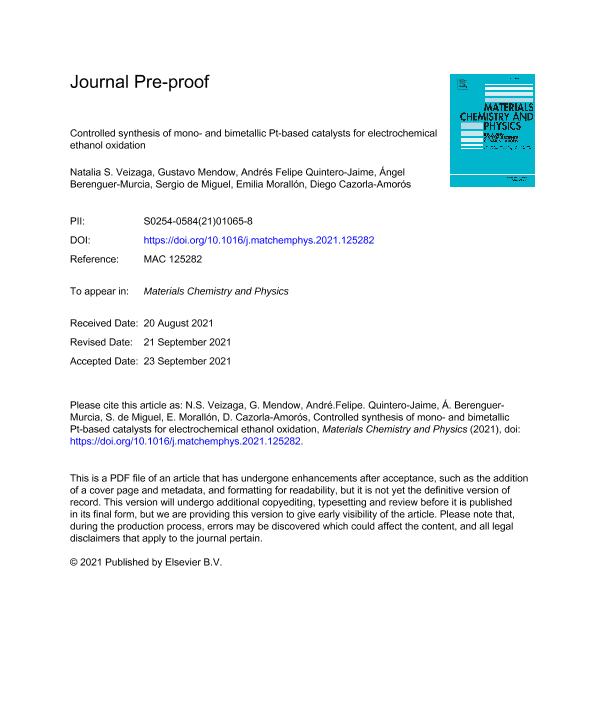Artículo
Controlled synthesis of mono- and bimetallic Pt-based catalysts for electrochemical ethanol oxidation
Veizaga, Natalia Soledad ; Mendow, Gustavo
; Mendow, Gustavo ; Quintero Jaime, Andrés Felipe; Berenguer Murcia, Ángel; de Miguel, Sergio Ruben
; Quintero Jaime, Andrés Felipe; Berenguer Murcia, Ángel; de Miguel, Sergio Ruben ; Morallón, Emilia; Cazorla Amorós, Diego
; Morallón, Emilia; Cazorla Amorós, Diego
 ; Mendow, Gustavo
; Mendow, Gustavo ; Quintero Jaime, Andrés Felipe; Berenguer Murcia, Ángel; de Miguel, Sergio Ruben
; Quintero Jaime, Andrés Felipe; Berenguer Murcia, Ángel; de Miguel, Sergio Ruben ; Morallón, Emilia; Cazorla Amorós, Diego
; Morallón, Emilia; Cazorla Amorós, Diego
Fecha de publicación:
01/2022
Editorial:
Elsevier Science SA
Revista:
Materials Chemistry and Physics
ISSN:
0254-0584
Idioma:
Inglés
Tipo de recurso:
Artículo publicado
Clasificación temática:
Resumen
Poisoning tolerance of Pt-based catalyst is an important parameter for the designing of direct electrochemical fuel cells (EFCs) based on electrooxidation of alcohols (i.e. methanol, ethanol). Applicability of direct ethanol EFCs is still challenging taking into account the lack of effective electrocatalysts which are able to produce high faradic current densities and high stability towards strong adsorption of C1 and C2 oxidation products. As we present here, mono- and bimetallic Pt-based electrocatalysts have been synthesized on a carbon black support for the elecotrooxidation of ethanol in acidic media. Depending of the molar ratio between poly-n-vinylpyrrolidone (PVP, acting as protecting agent) and Pt, nanoparticle size distribution has been controlled, obtaining an optimal condition of Pt loading and electroactive surface area (ECSA) for the PVP/Pt ratio = 1. The electrochemical behavior of electrocatalyst Pt/Re/CB-1 shows a negligible variation in the ECSA (98.3 m2 g−1) in comparison with the monometallic electrodes (90.2 m2 g−1). In contrast, addition of Ir tends to reduce the ECSA by agglomeration of some nanoparticles and decreasing its electrochemical performance. Incorporation of Re in the alloy promotes bond breaking of the intermediates adsorbed on surface, specifically adsorbed C2 molecules, releasing great number of the active sites from the Pt surface, minimizing the deactivation with cycling and providing remarkable stable catalyst with high specific current densities with the addition of small amounts of Re.
Palabras clave:
ELECTROCATALYST
,
ETHANOL OXIDATION
,
IRIDIUM
,
PLATINUM
,
RHENIUM
Archivos asociados
Licencia
Identificadores
Colecciones
Articulos(INCAPE)
Articulos de INST.DE INVEST.EN CATALISIS Y PETROQUIMICA "ING. JOSE MIGUEL PARERA"
Articulos de INST.DE INVEST.EN CATALISIS Y PETROQUIMICA "ING. JOSE MIGUEL PARERA"
Citación
Veizaga, Natalia Soledad; Mendow, Gustavo; Quintero Jaime, Andrés Felipe; Berenguer Murcia, Ángel; de Miguel, Sergio Ruben; et al.; Controlled synthesis of mono- and bimetallic Pt-based catalysts for electrochemical ethanol oxidation; Elsevier Science SA; Materials Chemistry and Physics; 275; 1-2022; 1-13
Compartir
Altmétricas



